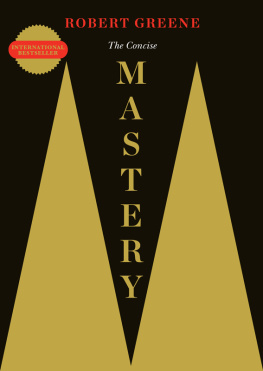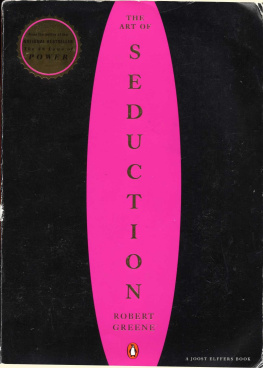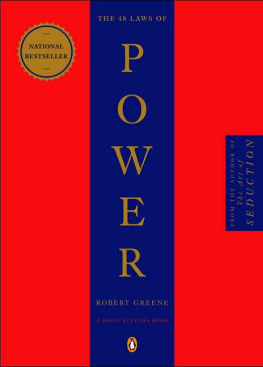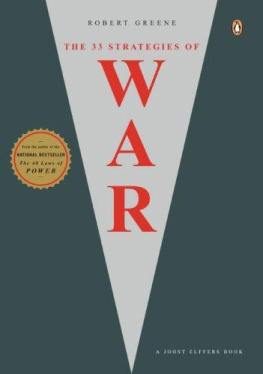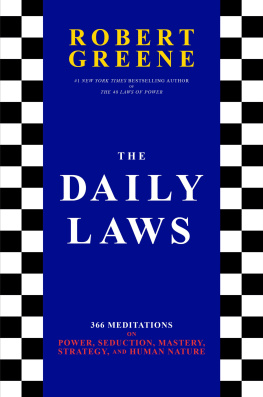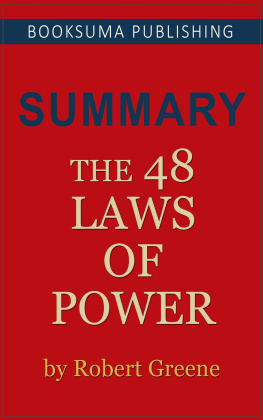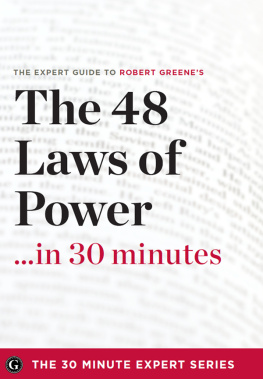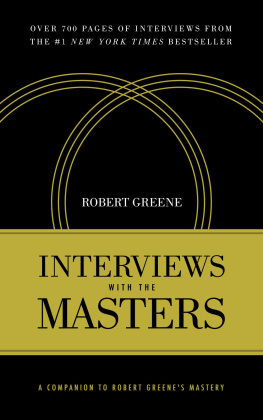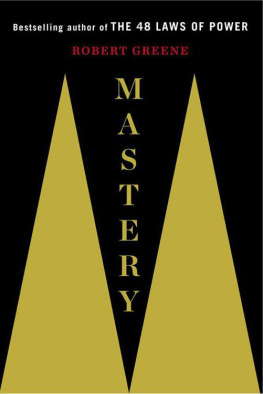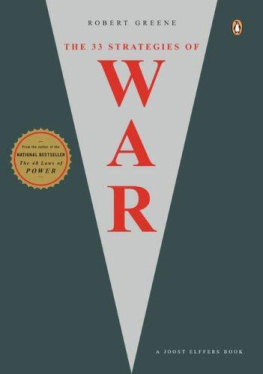The Concise
MASTERY
Robert Greene has a degree in classical studies and is the author of four bestselling books, including The 48 Laws of Power and The 50th Law.
He lives in Los Angeles.
ALSO BY ROBERT GREENE
The 50th Law (with 50 Cent)
The 33 Strategies of War
(A Joost Elfers Production)
The Art of Seduction
(A Joost Elfers Production)
The 48 Laws of Power
(A Joost Elfers Production)
The Concise
MASTERY
RQBERT GREENE

This concise edition published in Great Britain in 2014 by
PROFILE BOOKS LTD
3A Exmouth House
Pine Street
London EC1R 0JH
www.profilebooks.com
Derived from Mastery, which was first published in Great Britain in 2012 by Profile Books and in the United States of America in 2012 by Viking, a division of Penguin Putnam Inc.
Copyright Robert Greene, 2012, 2014
The moral right of the author has been asserted.
All rights reserved. Without limiting the rights under copyright reserved above, no part of this publication may be reproduced, stored or introduced into a retrieval system, or transmitted, in any form or by any means (electronic, mechanical, photocopying, recording or otherwise), without the prior written permission of both the copyright owner and the publisher of this book.
A CIP catalogue record for this book is available from the British Library.
eISBN 978 1 84765 342 0
To Anna
INTRODUCTION
THE ULTIMATE POWER
Everyone holds his fortune in his own hands, like a sculptor the raw material he will fashion into a figure. But its the same with that type of artistic activity as with all others: We are merely born with the capability to do it. The skill to mold the material into what we want must be learned and attentively cultivated.
JOHANN WOLFGANG VON GOETHE
There exists a form of power and intelligence that represents the high point of human potential. It is the source of the greatest achievements and discoveries in history. It is an intelligence that is not taught in our schools nor analyzed by professors, but almost all of us, at some point, have had glimpses of it in our own experience. It often comes to us in a period of tensionfacing a deadline, the urgent need to solve a problem, a crisis of sorts. Or it can come as the result of constant work on a project. In any event, pressed by circumstances, we feel unusually energized and focused. Our minds become completely absorbed in the task before us. This intense concentration sparks all kinds of ideasthey come to us as we fall asleep, out of nowhere, as if springing from our unconscious. At these times, other people seem less resistant to our influence; perhaps we are more attentive to them, or we appear to have a special power that inspires their respect. We might normally experience life in a passive mode, constantly reacting to this or that incident, but for these days or weeks we feel like we can determine events and make things happen.
We could express this power in the following way: Most of the time we live in an interior world of dreams, desires, and obsessive thoughts. But in this period of exceptional creativity, we are impelled by the need to get something done that has a practical effect. We force ourselves to step outside our inner chamber of habitual thoughts and connect to the world. At these moments, suddenly exposed to new details and ideas, we become more inspired and creative.
Once the deadline has passed or the crisis is over, this feeling of power and heightened creativity generally fades away. We return to our distracted state and the sense of control is gone.
The problem we face is that this form of power and intelligence is either ignored as a subject of study or is surrounded by all kinds of myths and misconceptions, all of which only add to the mystery. We imagine that creativity and brilliance just appear out of nowhere, the fruit of natural talent, or perhaps of a good mood, or an alignment of the stars. It would be an immense help to clear up the mysteryto name this feeling of power, and to understand how it can be manufactured and maintained.
Let us call this sensation masterythe feeling that we have a greater command of reality, other people, and ourselves. Although it might be something we experience for only a short while, for othersMasters of their fieldit becomes their way of life, their way of seeing the world. And at the root of this power is a simple process that leads to masteryone that is accessible to all of us.
The process can be illustrated in the following manner: Let us say we are learning the piano, or entering a new job where we must acquire certain skills. In the beginning, we are outsiders. Our initial impressions of the piano or the work environment are based on prejudgments, and often contain an element of fear. When we first study the piano, the keyboard looks rather intimidatingwe dont understand the relationships between the keys, the chords, the pedals, and everything else that goes into creating music. In a new job situation, we are ignorant of the power relationships between people, the psychology of our boss, the rules and procedures that are considered critical for success. We are confusedthe knowledge we need in both cases is over our heads.
Although we might enter these situations with excitement about what we can learn or do with our new skills, we quickly realize how much hard work there is ahead of us. The great danger is that we give in to feelings of boredom, impatience, fear, and confusion. We stop observing and learning. The process comes to a halt.
If, on the other hand, we manage these emotions and allow time to take its course, something remarkable begins to take shape. As we continue to observe and follow the lead of others, we gain clarity, learning the rules and seeing how things work and fit together. If we keep practicing, we gain fluency; basic skills are mastered, allowing us to take on newer and more exciting challenges.
At a certain point, we move from student to practitioner. We try out our own ideas, gaining valuable feedback in the process. We use our expanding knowledge in ways that are increasingly creative. Instead of just learning how others do things, we bring our own style and individuality into play.
As years go by and we remain faithful to this process, yet another leap takes placeto mastery. The keyboard is no longer something outside of us; it is internalized and becomes part of our nervous system, our fingertips. In our career, we now have a feel for the group dynamic, the current state of business. We can apply this feel to social situations, seeing deeper into other people and anticipating their reactions. We can make decisions that are rapid and highly creative. Ideas come to us. We have learned the rules so well that we can now be the ones to break or rewrite them.
In the process leading to this ultimate form of power, we can identify three distinct phases or levels. The first is the Apprenticeship; the second is the Creative-Active; the third, Mastery. In the first phase, we stand on the outside of our field, learning as much as we can of the basic elements and rules. In the second phase, through much practice and immersion, we see into the inside of the machinery, how things connect with one another, and thus gain a more comprehensive understanding of the subject. With this comes a new powerthe ability to experiment and creatively play with the elements involved. In the third phase, our degree of knowledge, experience, and focus is so deep that we can now see the whole picture with complete clarity.
We can call this power intuition, but intuition is nothing more than a sudden and immediate seizing of what is real, without the need for words or formulas.
Next page
